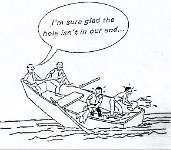
David Brooks must be reading my blog again. His[ op-ed piece](http://www.nytimes.com/2011/09/27/opinion/brooks-the-lost-decade.html?hp) today (9/27/11) was the clearest recognition that he understands that the world is complex and the “big” problems of today are not amenable to simple, technocratic, ideological solutions. The headline of the piece, The Lost Decade?, is a bit excessive. Maybe, just maybe, it will instead be the decade we find ourselves and turn to a path towards sustainable and the realization of our vision of flourishing. Brooks speaks of taking on the big institutions and begin to change them at the core. (My words, not his, but the same ideas.) The article focuses on the financial/economic crisis and the many “causes” attributed to it. Only a week ago I devoted my class at the Marlboro College Graduate School MBA in Managing for Sustainability to systems thinking, another way to describe what Brooks finds missing.
> This crisis has many currents, which merge and feed off each other. There is the lack of consumer demand, the credit crunch, the continuing slide in housing prices, the freeze in business investment, the still hefty consumer debt levels and the skills mismatch — not to mention regulatory burdens, the business class’s utter lack of confidence in the White House, the looming explosion of entitlement costs, the public’s lack of confidence in institutions across the board.
>
> No single one of these currents prolongs the crisis. It is the product of the complex interplay between them. To put it in fancy terms, the crisis is an emergent condition — even more terrible than the sum of its parts.
He calls the crisis an emergent condition, more than a concatenation of all the singular woes we face today. I would argue a bit with his use of “emergent.” Crisis is just an ordinary word used to describe very bad situations, in this case of the failure of the system to continue to produce all the normative outcomes it is supposed to. It would be more precise to deem the current crisis a failure at the system level or a departure of the system from its norms. Emergent properties are involved, but they are the ones that are vanishing as the system sputters toward a stop. These include immaterial qualities like confidence, security, trust-all of which emerge when the system is running well, along with the tangible financial outputs. Some might argue that money is not really material, but that’s not relevant to this train of thought. Inequality is another emergent property that is getting larger as the system shows signs of collapse.
Putting aside this semantic difference, Brooks is smack on in faulting the political system and its leaders as incompetent (again, my word) to see and acknowledge the complexity involved here and the need to think in holistic terms (his word).
> Yet the ideologues who dominate the political conversation are unable to think in holistic, emergent ways. They pick out the one factor that best conforms to their preformed prejudices and, like blind men grabbing a piece of the elephant, they persuade themselves they understand the whole thing.
Brooks lists a number of the ideological solutions both of the US political wings are stuck on, using a familiar saying: “To a man in love with his hammer, every problem requires a nail.” Wisely he stops short of offering the “solution.” To do so would contradict the basic point he is making. He does suggest that institutions-the tax code, banking, housing, entitlements-must be rebuilt from the bottom, hoping “that by getting the long-term fundamentals right you’ll set off a positive cascade to reverse the negative ones.” Note his use of “hope.” He is correct to note that complexity does not allow determinant solutions. The most we can do is use our best understanding of what is going on as starters and carefully adapt the governance as the outcomes start to be evident, albeit unclear and fuzzy. His most prescriptive statement, “We need an approach that is both grander and more modest.”, is a call for both pragmatism and boldness, both of which qualities are entirely absent today. Finally, he recognizes that the real source of the problems lies not in the world, but in our inability to change the way we think about it, a theme quite familiar to those who follow this blog.